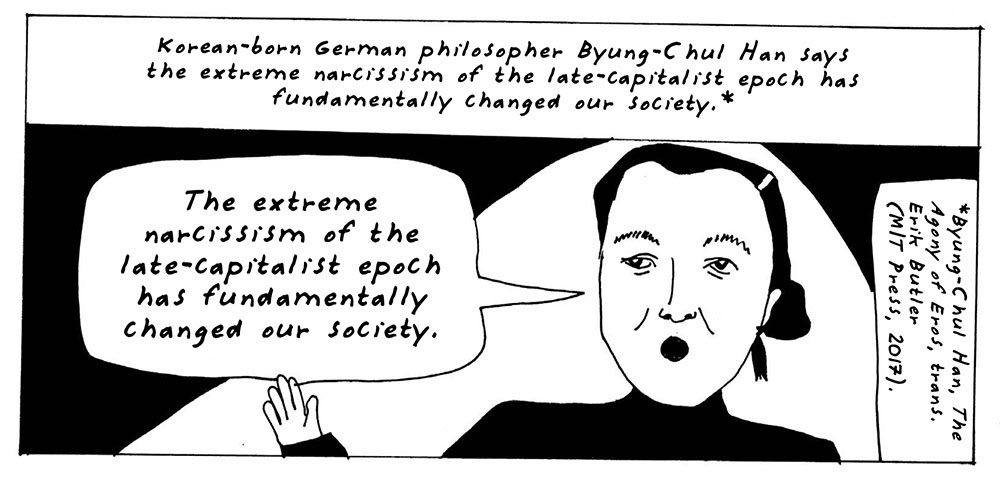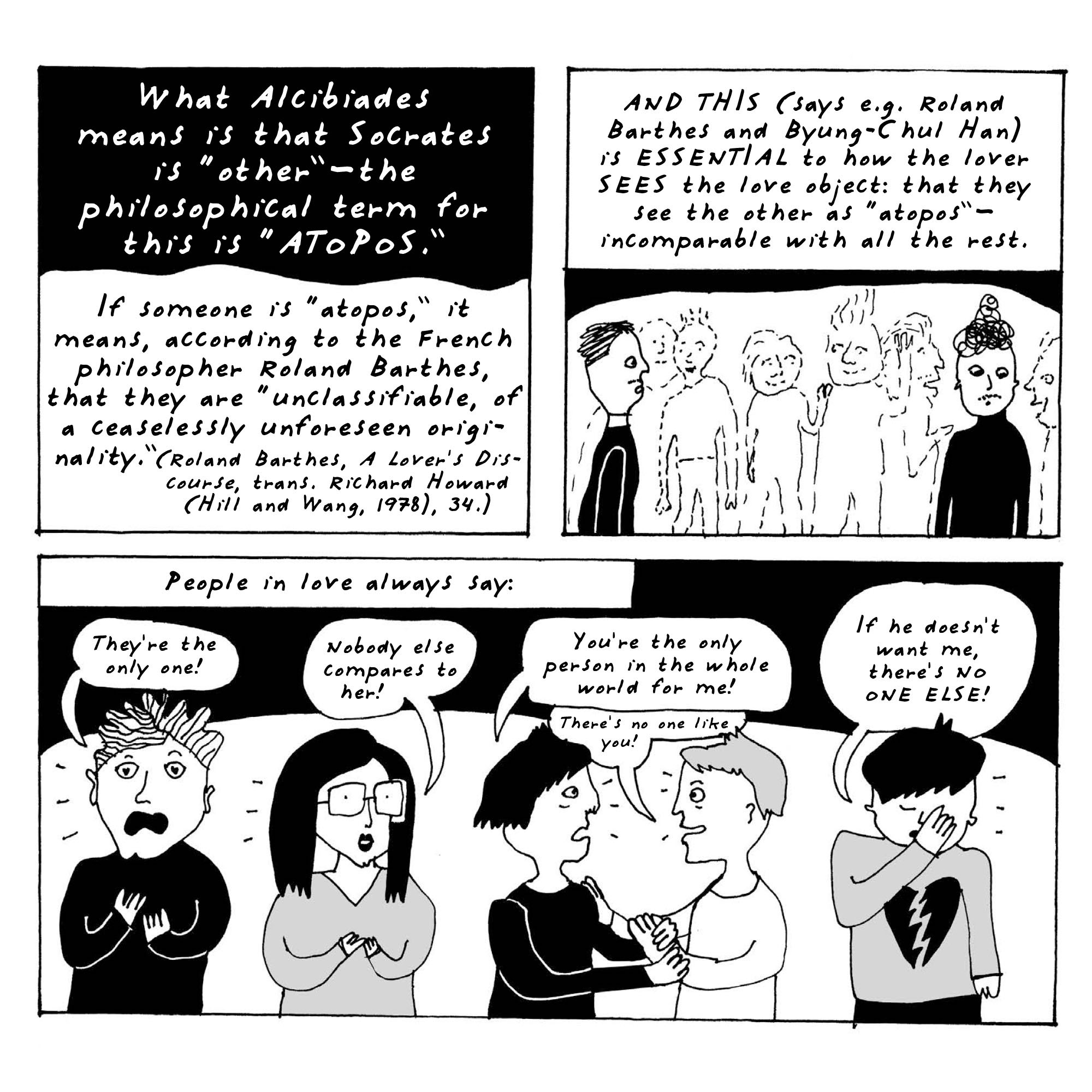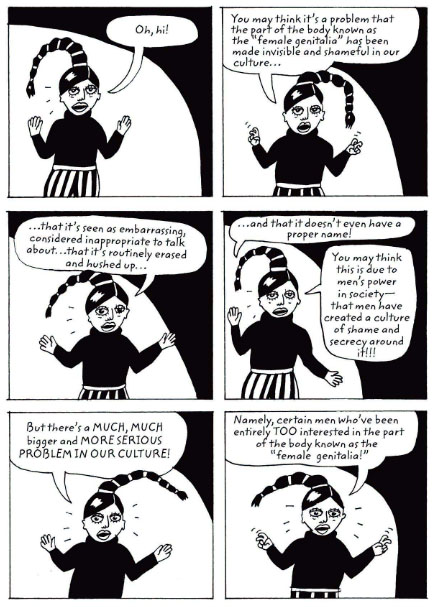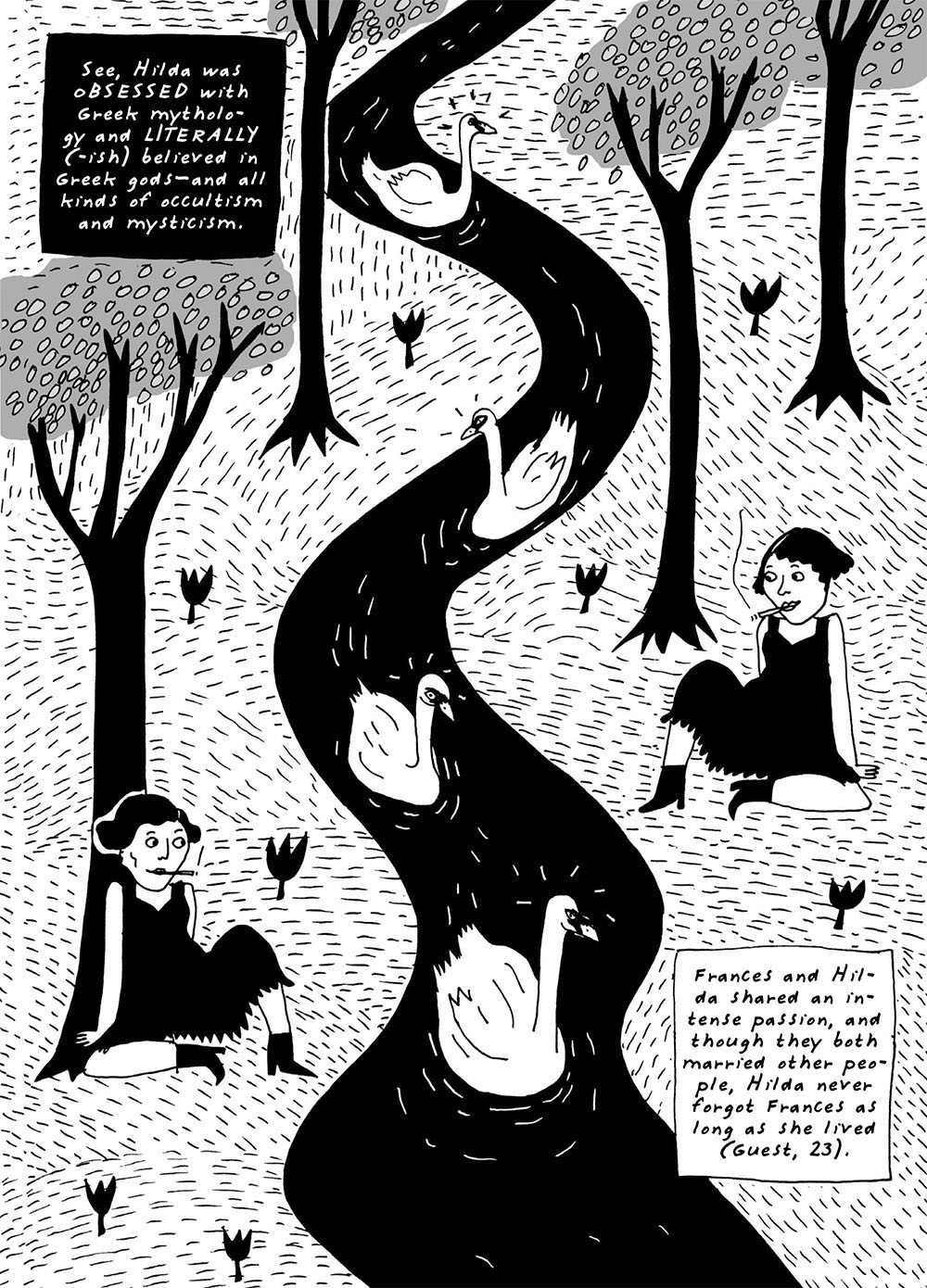When Titanic fans realized the movie was turning twenty-five in December, Twitter erupted with variations of a single joke: “I assume Leonardo DiCaprio will no longer want to be in it.” I’d just begun reading cartoonist and activist Liv Strömquist’s The Reddest Rose, translated from the Swedish by Melissa Bowers, and enjoyed the synchronicity. Strömquist’s new book of graphic nonfiction opens with two spreads of amusingly redundant panels, drawn in loose, cartoony lines. In each, an impassive DiCaprio stands next to a (slightly) different thin, blonde model, dumped before her twenty-sixth birthday. He licks a heart-shaped lollipop emblazoned with the words: “I don’t feel it.”

There’s something inherently funny about a book of comics that spans the entire history of romantic love: its flaws are obvious because its possibilities are endless. Where else can Korean German philosopher Byung-Chul Han share pages with Beyoncé? The book’s strengths come from high-low comedy and frequent, pinballing register shifts. Strömquist is as at home referencing Ancient Greek history—Alcibiades pledging his love to Socrates is a hilarious, standout scene—as she is commenting on the Swedish reality show Married at First Sight.
Strömquist’s blocky, black-and-white style is rooted in the ’90s DIY and Riot Grrl movements. According to an interview in London-based Huck magazine, Strömquist never felt “good enough” as a fiction writer, and found the freedom to experiment in zine culture. She’s not interested in high-brow or high realism, and instead draws with a “chunky, punky pen”—a great phrase that Fantagraphics, her North American publisher, includes on their site. Her style has drawn comparisons to Julie Doucet and Gabrielle Belle, and her sense of humor reminds me of Kate Beaton’s webcomic Hark! A Vagrant—especially in the sections that combine literary history with meme culture. Strömquist’s style offers a helpful shorthand; the eye moves quickly through the illustrations, allowing for an ease of comprehension—a necessity with such complex, footnoted text. She also uses repetition to liven up the dry, academic language:

That Strömquist is able to laugh at herself while exploring such heady texts at first endeared me to her. A narrator that doesn’t take herself too seriously makes the research approachable. I felt prepared, even, to understand excerpts from Byung-Chul Han’s work, who offers the book’s first theory: that our late-capitalist era is characterized by a narcissism so extreme that we are now incapable of viewing other people as “atopos,” or unclassifiably other. Through Han’s lens, Strömquist explains that DiCaprio cannot love another, because he cannot truly see them as other.

“Eeeh . . . ok,” Strömquist writes, moving on to the book’s second theory on love’s alleged disappearance: “the rise of the rational choice.” But I wasn’t ready to leave Han behind. The narrator’s dismissive, silly tone made me curious: Who is this narrator? What is her own relationship to romantic love?
These moments when the narrator speaks are the most frustrating of the book. Perhaps the comedy isn’t translating. The light touch grates on me, as it allows the narrator to evade making any claims or decisions of her own.
Later, when discussing the theory that modern-day masculinity is expressed by emotional distance, Strömquist again avoids telling the reader whether she believes this to be true, skirting any bold or clear statements: “I’m saying this MIGHT be the case!! It doesn’t HAVE to be the case. Calm down! I’m not saying this is ‘good’ or ‘bad!’ I’m just saying that the result is NO LOVE.”
For a book lampooning how late capitalism has made us shallow, The Reddest Rose is also awfully shallow. I longed for the author’s own observations, beliefs, or anecdotes—or at least, as in Fruit of Knowledge, I hoped she’d confess to feeling something. The narrator has more in common with that lollipop of DiCaprio’s than she’d care to admit: “I don’t feel it.”

From “Fruit Of Knowledge: The Vulva vs. The Patriarchy”
The Reddest Rose borrows its title from the modernist poet H.D., who, Strömquist writes, “had a great talent, or propensity, for falling in love.” The title is apt, because it emphasizes the book’s strongest section. At its start, seventy-four-year-old H.D. lies in a Swiss sanitorium. A journalist visits her bedside. Awestruck with love, H.D. writes this poem: “Why did you come / to trouble my decline? / I am old (I was old till you came); / the reddest rose unfolds, / (which is ridiculous / in this time, this place . . .”
Strömquist seems to take a special, gleeful interest in telling H.D.’s stories, the wild highs—the queer love triangles, the dolphins from another dimension, Freud and Ezra Pound and D.H. Lawrence and lesbian heiresses! The art shifts too. In the book’s first three sections, I found myself longing for white space, for breath, because the pages are text heavy—sometimes with captions, dialogue, footnotes, and narration all in one panel. It’s funny, yes, to see philosophers vie for space with pop stars, but it can feel chaotic. Yet the pacing is perfectly balanced in the long third section about H.D., and the splash pages—dramatic, full-page panels—are beautifully detailed.
When Strömquist writes and draws about literary history—H.D., The Little Prince, Anna Karenina—the quality of the illustrations soars, as does the page composition and the conversation between text and art. Strömquist is skilled at finding the exact right moment to include color: H.D.’s mystical blue and pink, dolphins, the Little Prince’s red rose, and Ariadne’s red thread. In these sections, the balance between Strömquist’s research and all-caps comedy feels just right. I even understand the narrator more: her attention is akin to approval.

So is the feeling of falling in love—allowing yourself to succumb to irrational ecstasy—increasingly rare? To borrow a phrase from Strömquist by way of Melissa Bowers: “Maybe, my friends!!! Maybe, maybe!!!!!”
What I can say for sure: this book would be fun, light fodder for a dinner party, a book to leaf through and debate while laughing about contemporary humanity’s least appealing, consumerist traits—those people, over there, the ones who don’t feel it.
The Reddest Rose: Romantic Love from the Ancient Greeks to Reality TV by Liv Strömquist, translated from the Swedish by Melissa Bowers (Fantagraphics, 2023).
© 2023 by Nichole LeFebvre. All rights reserved.










